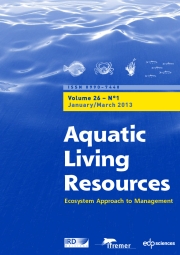Article contents
Marine mammal bycatch in Spanish Mediterranean large pelagic longline fisheries, with a focus on Risso’s dolphin (Grampus griseus)
Published online by Cambridge University Press: 17 December 2012
Abstract
The western Mediterranean is an important fishing area in which the Spanish longline fleet operates. Longline fisheries affect several species of marine mammals, sea turtles, sharks and seabirds, all of which are especially sensitive to fishing mortality. Given international efforts to identify and reduce the bycatch of sensitive species, an onboard observer program was implemented by the Spanish Oceanographic Institute (IEO, Instituto Español de Oceanografía). The aim of the present study was to report data on marine mammal bycatch in the western Mediterranean. The additional aim was to improve knowledge about the possible effects of the Spanish longline fisheries on cetacean populations, particularly Risso’s dolphin, and to suggest improvements to fisheries management. Data on marine mammal bycatch were collected during the period 2000–2009. Differences are reported for catch per unit effort (CPUE, defined as marine mammals per 1000 hooks) for each type of gear (n = 7), as well as their effect on specific marine mammal species. A total of 5 398 297 hooks were monitored, which yielded 56 marine mammals belonging to 4 different species. Our results indicate that Risso’s dolphin is the species most affected by the longline fishery in the western Mediterranean (n = 33). We built a predictive model for Risso’s dolphin bycatch using variables associated with the technical characteristics of the fishery, geographic location and seasonality. We performed a binary logistic regression of the presence/absence of Risso’s dolphin bycatch to test whether the probability of incidentally catching one or more dolphins may be predicted by some of the explanatory variables selected. Our results indicate that Risso’s dolphin was mainly caught using Japanese longline (LLJAP) or an experimental home-based longline (LLHBexp) over the continental shelf. Because LLHBexp is an experimental type of gear that was only used occasionally by the fleet, controlling the use of LLJAP over the continental shelf could strongly reduce the impact of these fisheries on populations of Risso’s dolphin in the western Mediterranean.
- Type
- Research Article
- Information
- Copyright
- © EDP Sciences, IFREMER, IRD 2012
References
- 17
- Cited by


